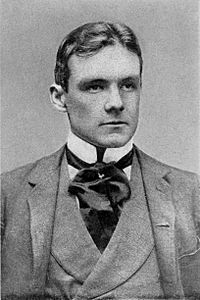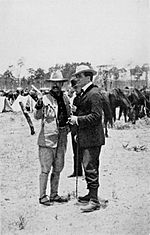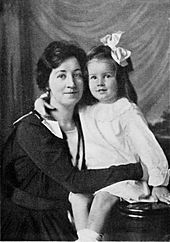Richard Harding Davis facts for kids
Quick facts for kids
Richard Harding Davis
|
|
|---|---|

Davis in 1890
|
|
| Born | April 18, 1864 Philadelphia, Pennsylvania, U.S. |
| Died | April 11, 1916 (aged 51) New York City, New York, U.S. |
| Resting place | Leverington Cemetery, Philadelphia, Pennsylvania, U.S. |
| Occupation |
|
| Nationality | American |
| Period | 19th and early 20th century |
| Genre | History, romantic novels, short stories |
| Subject | Africa, War, Cuba, Europe |
| Spouse | Cecil Clark (m. 1899–1912; divorce) Bessie McCoy (1912–1916; his death) |
| Children | 1 |
| Signature | |
Richard Harding Davis (born April 18, 1864 – died April 11, 1916) was a famous American journalist and writer. He wrote many stories and plays. He is best known as the first American war correspondent to report from major conflicts. These included the Spanish–American War, the Second Boer War, and World War I.
Davis's writing helped the political career of Theodore Roosevelt, who later became president. He also played a big part in how American magazines developed. He even influenced fashion, making the clean-shaven look popular for men in the early 1900s.
Contents
Richard Harding Davis's Early Life and Career
Growing Up in Philadelphia
Richard Harding Davis was born on April 18, 1864, in Philadelphia, Pennsylvania. His mother, Rebecca Harding Davis, was a well-known writer. His father, Lemuel Clarke Davis, was also a journalist. He edited a newspaper called the Philadelphia Public Ledger.
As a young man, Davis went to the Episcopal Academy. After a year at Swarthmore College, he moved to Lehigh University in 1882. His uncle, H. Wilson Harding, was a professor there. While at Lehigh, Davis published his first book. It was called The Adventures of My Freshman (1884). This book was a collection of short stories. Many of these stories first appeared in the student magazine, the Lehigh Burr. In 1885, Davis transferred to Johns Hopkins University.
Starting as a Journalist
After college, his father helped him get his first job as a journalist. He worked at the Philadelphia Record. He soon left that job.
Davis first became well-known in 1889. He reported on the terrible damage in Johnstown, Pennsylvania. This happened after a huge flood, known as the Johnstown Flood. He also gained fame by reporting on other important events. One such event was the first time a new method was used for a legal punishment in 1890.
Becoming a War Correspondent
Davis became a managing editor for Harper's Weekly. He was one of the world's top war correspondents. He reported on the Second Boer War in South Africa. As an American, he could see the war from both the British and Boer sides. Davis also worked for other newspapers and magazines. These included the New York Herald, The Times, and Scribner's Magazine.
Davis's Influence and Popularity
A Model for Heroes
Richard Harding Davis was popular among many famous writers of his time. People thought he was the inspiration for the "Gibson man." This was a dashing male character created by illustrator Charles Dana Gibson. The "Gibson man" was like the male version of the famous Gibson Girl.
The writer Sinclair Lewis mentioned Davis in his book Dodsworth. Lewis described Davis as an exciting, adventure-seeking hero.
Successful Books and Films
Davis had great success with his 1897 novel, Soldiers of Fortune. He later helped turn it into a play. The novel was made into a movie twice. The first movie was in 1914, and the second was in 1919. The 1914 movie was filmed in Cuba, where Davis's novel was set. Davis was even there during the filming.
Reporting on Wars
During the Spanish–American War, Davis was on a United States Navy warship. He saw the shelling of Matanzas, Cuba. This was part of the Battle of Santiago de Cuba. His story made big headlines. Because of this, the Navy stopped reporters from being on American naval ships for the rest of the war.

Davis was a good friend of Theodore Roosevelt. He helped create the famous stories about the Rough Riders. Davis was even made an honorary member of this group.
Davis traveled and wrote widely. He reported on life in Central America, the Caribbean, Rhodesia, and South Africa. He was one of many war correspondents who covered the Russo-Japanese War. He reported from the side of the Japanese forces.
Later, Davis reported from the Salonika front during the First World War. He was briefly arrested by the Germans, who thought he was a spy. However, he was soon released.
Richard Harding Davis's Personal Life
Family and Relationships
Davis was married two times. His first wife was Cecil Clark, an artist. They married in 1899 and divorced in 1912. After that, he married Bessie McCoy. She was an actress and performer known for her "Yama Yama Man" routine. Davis and Bessie had one daughter, named Hope.
His Final Years
Richard Harding Davis died from a heart attack on April 11, 1916. He was on the telephone at the time. This was just seven days before his 52nd birthday. He was buried in Leverington Cemetery in Philadelphia.
His friend and fellow author John Fox, Jr. was very surprised by his death. He wrote, "He was so intensely alive that I cannot think of him as dead—and I do not. He is just away on another of those trips and it really seems queer that I shall not hear him tell about it." His wife Bessie also died young, at age 42 in 1931.
Davis's Legacy and Influence
Remembering His Home
You can find a special plaque at 21st and Chancellor Streets in Philadelphia. This plaque marks the house where Richard Harding Davis grew up.
Books to TV Shows
Davis's book Gallegher and Other Stories was turned into a TV series. It was called Gallegher. The show starred Roger Mobley, Edmond O'Brien, and Harvey Korman. It was part of Walt Disney's Wonderful World of Color on NBC.
Partial List of Works by Richard Harding Davis
- Stories for Boys (1891)
- Cinderella and Other Stories (1891)
- Gallegher, and Other Stories (1891)
- The West from a Car Window (1892)
- Van Bibber and Others (1892)
- The Rulers of the Mediterranean (1893)
- The Exiles, and Other Stories (1894)
- Our English Cousins (1894)
- About Paris (1895)
- The Princess Aline (1895)
- Three Gringos in Central America and Venezuela (1896)
- Soldiers of Fortune (1897)
- Cuba in War Time (1897)
- Dr. Jameson's Raiders vs. the Johannesburg Reformers (1897)
- A Year From a Reporter's Note-Book (1898)
- The King's Jackal (1898)
- The Cuban & Porto Rican Campaigns (1899)
- The Lion and the Unicorn (1899)
- With Both Armies (1900), about the Second Boer War
- In the Fog (1901)
- Ranson's Folly (1902)
- Captain Macklin: His Memoirs (1902)
- The Bar Sinister (1903)
- Real Soldiers of Fortune (1906)
- The Congo and coasts of Africa (1907)
- The Scarlet Car (1906)
- Vera, the Medium (1908)
- The White Mice (1909)
- Once Upon A Time (1910)
- Notes of a War Correspondent (1910)
- The Nature Faker (1910)
- The Red Cross Girl (1912)
- The Lost Road and Other Stories (1913)
- Peace Manoeuvres; a Play in One Act (1914)
- The Boy Scout (1914)
- With the Allies (1914)
- With the French in France and Salonika (1916)
- The Man Who Could Not Lose (1916)
- The Deserter (1917)
Films Based on Davis's Works
- Ranson's Folly, directed by Edwin S. Porter (1910, short film)
- Her First Appearance, directed by Ashley Miller (1910, short film)
- Gallegher, directed by Ashley Miller (1910, short film)
- The Winning of Miss Langdon, directed by Edwin S. Porter (1910, short film)
- The Romance of Hefty Burke (1910, short film)
- An Eventful Evening (1911, short film)
- The Disreputable Mr. Raegen (1911, short film)
- How the Hungry Man Was Fed (1911, short film)
- Van Bibber's Experiment, directed by Ashley Miller (1911, short film)
- The Crucial Test (1911, short film)
- How Sir Andrew Lost His Vote, directed by Ashley Miller (1911, short film)
- Eleanor Cuyler (1912, short film)
- Soldiers of Fortune, directed by William F. Haddock (1914)
- The Man Who Could Not Lose, directed by Carlyle Blackwell (1914)
- The Last Chapter, directed by William Desmond Taylor (1914)
- The Lost House, directed by Christy Cabanne (1915, short film)
- Captain Macklin, directed by John B. O'Brien (1915)
- The Dictator, directed by Oscar Eagle (1915)
- The Galloper, directed by Donald MacKenzie (1915)
- Ranson's Folly, directed by Richard Ridgely (1915)
- Playing Dead, directed by Sidney Drew (1915)
- The Buried Treasure of Cobre, directed by Frank Beal (1916, short film)
- Somewhere in France, directed by Charles Giblyn (1916)
- Vera, the Medium, directed by Broncho Billy Anderson (1917)
- The Boy Who Cried Wolf, directed by Edward H. Griffith (1917)
- Billy and the Big Stick, directed by Edward H. Griffith (1917)
- Gallegher, directed by Ben Turbett (1917, short film)
- The Scarlet Car, directed by Joseph De Grasse (1917)
- The Trap, directed by Frank Reicher (1919)
- Soldiers of Fortune, directed by Allan Dwan (1919)
- The Men of Zanzibar, directed by Rowland V. Lee (1922)
- Restless Souls, directed by Robert Ensminger (1922)
- The Dictator, directed by James Cruze (1922)
- The Scarlet Car, directed by Stuart Paton (1923)
- The Exiles, directed by Edmund Mortimer (1923)
- Stephen Steps Out, directed by Joseph Henabery (1923)
- Cupid's Fireman, directed by William A. Wellman (1923)
- 24 short films starring Earle Foxe (1924–1927)
- Honor Among Men, directed by Denison Clift (1924)
- White Mice, directed by Edward H. Griffith (1926)
- Ranson's Folly, directed by Sidney Olcott (1926)
- Almost Human, directed by Frank Urson (1927)
- Let 'Er Go Gallegher, directed by Elmer Clifton (1928)
- Driftwood, directed by Christy Cabanne (1928)
- Fugitives, directed by William Beaudine (1929)
- It's a Dog's Life, directed by Herman Hoffman (1955)
- Gallegher (1965–1967, Disney TV series, 10 episodes)
Images for kids
See also
 In Spanish: Richard Harding Davis para niños
In Spanish: Richard Harding Davis para niños
 | Anna J. Cooper |
 | Mary McLeod Bethune |
 | Lillie Mae Bradford |



